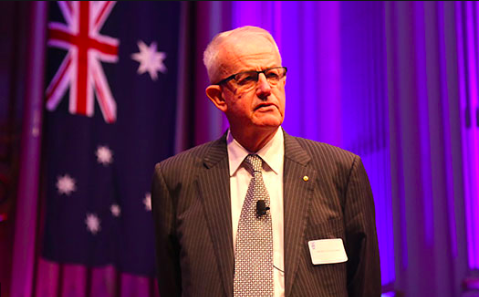
CLAN patron Bob Atkinson is a decorated former Queensland Police Commissioner with a lengthy career of detective and police prosecutor work to his credit. He oversaw Fitzgerald inquiry reforms from 1990 plus Public Sector Management Commission Review and report recommendations of the Queensland Police Service in 1993. In 2013, he was appointed one of six commissioners to the Royal Commission into Institutional Responses to Child Sexual Abuse. He spoke with The Clanicle about that journey …
How did you come to the Royal Commission? Did you know of CLAN?
I wasn’t fully aware of CLAN before the Royal Commission. I had retired as Queensland Police Commissioner 31 October 2012 and about two weeks later Julia Gillard announced the Royal Commission.
I was contacted and asked if I’d be interested in a role and I said: ‘Yes.’ I had always had a long-term interest in the safety and welfare of children. For 20 years, as a detective, I had a lot of exposure to child abuse issues and child welfare issues as well.
In earlier days, some 50 years ago, the police’s role was greater in that space than today – with children needing care and protection. The consequences for many of those children who were placed in institutions were terrible.
It was a great privilege to be one of six commissioners. It was early January 2013 when the letters of patent – the terms of reference – were signed off and we gathered together in Sydney. It probably took six months to get fully up and running.
So what the scope of the job you were undertaking?
The terms of reference required us to listen to what happened to people who were subjected to abuse. Our inquiry was limited to child sexual abuse in institutions. Many children suffered horrendous physical, psychological and emotional abuse as well. I think because of the sadistic nature of some of the physical abuse, it approached the level of sexual abuse. Another aspect was that a lot of kids were abused in family settings as well.
And children already abused in the family home also perpetuating similar abuses in institutions?
The issue of children, which means up to 18, abusing other children was a terrible problem and a real concern and continues to be so today.
So the terms of reference …
The terms of reference were to look at prevention, response to reports and allegations of abuse, and also how to support people who experienced abuse – including redress. So three things: prevention, response, support.
How did you proceed?
Three ways.
Firstly, the private sessions program, which was entirely voluntary.
Secondly, public hearings, which were held throughout the country, examining a wide range of issues and institutions. The publicity from these created public awareness of what had occurred and the extent of it.
The third area was a research program with a number of universities across Australia.
All three contributed to the Royal Commission’s recommendations.
How did you perceive CLAN’S role as the commission’s investigations unfolded?
CLAN was very supportive in all aspects. CLAN made submissions, provided evidence, supported people for private sessions right across Australia. It did wonderful work in encouraging people to come forward and in supporting those people when they came forward.
What was your impression of the people relating these accounts?
We were concerned they wouldn’t want to come forward and talk to a complete stranger about these events. But instead they showed enormous courage in doing so.
I found, in the private sessions, almost a consistent theme as to why they came forward and relived what had happened to them; which was that they didn’t want to see what happened to them happen to any other children.
They were very noble. With this added to their courage, it made it a real privilege to be involved. I’ll always admire them for that. And the chance to be a part of that.
Were you surprised by the size and scope of the task?
So many people came forward. We soon realised it couldn’t be completed in three years and we sought an extension to five years to enable us to do the work. And we looked at a whole range of institutions, not just churches, across the country.
The six commissioners heard more than 8000 private sessions as well as some 1500 written submissions and the public hearings program.
We produced three reports as we went along.
The first was Redress; the idea was to make it sooner, not later.
Second was working with children checks, recommending a national scheme.
The third report was about the criminal justice system.
When we concluded, 15 December 2017, CLAN was there in Canberra, gathered at the gates of Government House where we delivered the final report.
We handed over 17 volumes. Including the three earlier reports, there was a total of 409 recommendations.
How did you feel about the extraordinary length and breadth of the abuses?
Certainly I was disappointed and saddened by the extent and the fact so much was known to people in the institutions concerned. They covered it up at very senior levels in these organisations.
There were other reasons, too, that were consistent with some values of those earlier times: for example, where children were being abused by the clergy and would report this to their parents. But these abusers were held on such a high pedestal the parents wouldn’t believe the child.
Other values were considered more important than the abuse of children?
Yes. Protecting the reputation of the organisation, protecting colleagues and protecting the assets of the organisation. But the first two were the most common, right across the whole spectrum of all the organisations we looked at.
I was very saddened and disappointed at the extent and the number of organisations concerned.
The Royal Commission’s title was ‘Institutional Responses to Child Sex Abuse’. By the time we started, there was no doubt about it occurring. Many people held the view that the authorities who protected offenders were as bad as the abusers.
What of CLAN’s involvement, and yours as patron?
CLAN was very involved and very supportive of the work of the Royal Commission.
I have a high regard for CLAN. I think they do fine work and it’s been an honour and a privilege to be a supportive advocate as a patron. I’m appreciative of that opportunity.
You’ve donated a tie to the Australian Orphanage Museum?
Leonie Sheedy asked for me for two ties. The first was the tie I wore at the first public hearing. The second I wore at the final public hearing, five years later. Coincidentally, it was blue and yellow which just happened to be the CLAN colours
What are your thoughts on the Australian Orphanage Museum?
I think it is really important to have this museum as a permanent, visible and tangible reminder of a terrible and of a sad part of our history that should be acknowledged and not bypassed or forgotten.
Redress. Should it be broadened? Should tax-exemption status be denied those who don’t sign up?
I believe there should be some form of sanction for organisations that clearly should join the Redress Scheme but refuse to do so.
The Aged Care Royal Commission, do you see parallels?
My understanding is that a lot of people who as children were placed in institutions have a real fear of being returned to an institution in old age.
This article appeared in Care Leavers Australasia Network’s The Clanicle magazine, February 2020.


